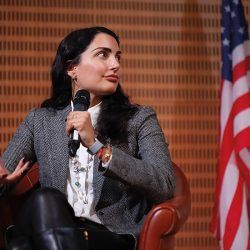The roadmap to social inclusion

Angelica Krystle Donati of Donati S.p.A. discusses a new leadership model that targets inequality across business, politics and society
It has been 15 years now since I graduated from the London School of Economics, and then achieved an MBA at Oxford University. During this time, working first in the UK and then in Italy, my career has unfolded across several sectors, all of which had one thing in common: from financial services to construction, all are male-dominated industries.
That said, from the start I worked with female colleagues who were able to perfectly reconcile their family and working lives without giving up their careers. These were all women in leadership positions, who were not penalised simply because of their gender or because they had chosen to have a family as well as building a successful career. For the past 15 years, this has been the standard I have held the world to. In a world that functions fairly, no woman should be forced to choose between her work and her family, because a man would never have to. Furthermore, I firmly believe that women should be recognised for the qualities they bring to an organisation, and not just as a formal gesture.
Women encounter twice as many obstacles, stereotypes, and difficulties to prove their abilities and professional worthiness than men. The battle for gender equality is broad not just in professional fields, but across society and politics also.
Female inclusion is not simply a matter of affirmative action. After all, women make up 50% of the global population, so excluding them means giving up on having half of the world’s skills, talent and ideas.
It is still much harder for women to be “the first” to do something. As Kamala Harris, the first woman to become Vice President of the United States, reminds us: “You may be the first to do many things, but make sure you are not the last. And that’s why breaking barriers is worth it.”
Today we are called upon to set a new path for our future, and we must do it by breaking down barriers and removing obstacles, not just for our own sake, but for those who will follow in our footsteps.
Inclusion: A key pillar of growth
Inclusion is not only social: it’s economic, it concerns corporate governance and everyday choices. Working towards inclusion is not only ethical and desirable, but it is a real driver of socioeconomic development and this is more crucial than ever today, as we are facing one of the most challenging times in history.
Women bring skills and abilities that are essential to the political and work spheres. For this reason, in order to successfully write the next chapter of our global history post pandemic it will be fundamental not only to assign women to more roles, but to plan the recovery starting with the values that are intrinsic to a better future. Within these, “inclusion” should be first and foremost.
Much has changed since the days when a British politician said: “No woman of my time will become Prime Minister or Foreign Secretary”. The politician in question happens to have been Margaret Thatcher, and it turns out she proved this to be completely wrong. Today, the President of the European Commission, is a woman, Ursula von der Leyen. For years, the most powerful person in Europe was a woman, Chancellor Angela Merkel. And now the United States has a female Vice President.
Being a real leader
A new model of leadership, one of inclusive leadership, should allow individuals to take the same path regardless of one’s gender, race or socioeconomic background, and to have equal opportunities.
According to the Harvard Business Review, what leaders say and do can make a 70% difference in whether or not a person feels included. And this is important because, when individuals feel included, they are more likely to speak up and collaborate, all of which improves organisational performance.
Building a future for the next generation
We are facing one of the most difficult times in our history. We must pool our resources to generate fair, inclusive and sustainable economic growth. First of all, we must do this to prevent anyone in our communities from being left behind. This includes vulnerable people, but also the young who so often are left out and feel forced to leave their home country for better opportunities elsewhere. Instead, young people should be the driving force for new beginnings.
Through its Next Generation EU programme, Europe is committing €750bn to help all member states recover from the COVID crisis. This is not a gift, but a loan that future generations of Europe will have to repay, so we must acknowledge their role in the long-term economic health of the bloc by ensuring they inherit a fair and just society. This could and should be used to rebalance and empower often marginalised demographics.
We all must be fully aware of what the Recovery Fund and Next Generation EU represent: an intergenerational contract. The voices of young people are too often poorly considered in the assessments that guide public decision-making. The only way to design a better world for after the pandemic for those who will come after us is by including young people in decision-making processes and ensure that all decisions are made with their future in mind.
About the author:

For further information:


